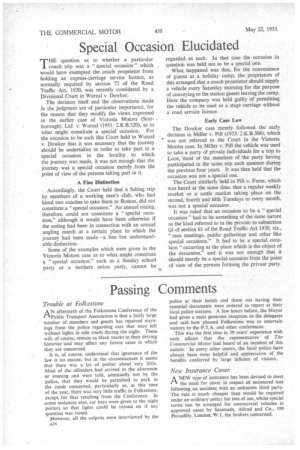Special Occasion Elucidated
Page 26

If you've noticed an error in this article please click here to report it so we can fix it.
THE question as to whether a particular coach trip was a "special occasion " which would have exempted the coach proprietor from holding an express-carriage service licence, as normally required by section 72 of the Road Traffic Act, 1930, was recently considered by a Divisional Court in Wurzal v. Dowker.
The decision itself and the observations made in the judgment are of particular importance, for the reason that they modify the views expressed in the earlier case of Victoria Motors (Scarborough), Ltd. v. Wurzal (1951. 2.K.B.520), as to what might constitute a special occasion. For the occasion to be such this Court held in Wurzal v. Dowker that it was necessary that the journey should be undertaken in order to take part in a special occasion in the locality to which the journey was made, it was not enough that the journey was a special occasion merely from the point of view of the persons taking part in it.
A Fine Distinction Accordingly, the Court held that a fishing trip by members of a working men's club, who had hired two coaches to take them to Boston, did not constitute a " special occasion." An annual outing, therefore, could not constitute a "special occasion," although it would have been otherwise if the outing had been in connection with an annual angling match at a certain place to which the journey had been made—a fine but understandable distinction.
Some of the examples which were given in the Victoria Motors case as to what might constitute a "special occasion," such as a Sunday school party or a mothers union party, cannot be regarded as such. In that case the occasion in questicin was held not to be a special one.
What happened was that, for the convenience of guests at a holiday camp, the proprietors of this arranged that a coach proprietor should supply a vehicle every Saturday morning for the purpose of conveying to the station guests leaving the camp. Here the company was held guilty of permitting the vehicle to be used as a stage carriage without a road service licence.
Early Case Law The Dowker case merely followed the early decision in Miller v. Pill (-1933. 2.K.B.308), which was not referred to the Court in the Victoria Motors case. In_Miller v. Pill the vehicle was used to take a party of private individuals for a trip to Looe, -most of The members of the party having participated in the same trip each s,unimer during the previous four years. It was then held that the . . occasion was not a, special one.
The Court similarly held in Pill v. Fume, which was heard at the same time, that a regular weekly market or a cattle market taking place on the second, fourth. and _fifth Tuesdays in every month, was not a special occasion.
It was ruled that an occasion to be a "special occasion" had to be something of the same nature as the kind referred to in the proviso to subsection (i) of section 61 of the Road Traffic Act 1930, viz., "race meetings, public gatherings and other like special occasions." It had to be a special occa"sion "occurring at the place which is the object of the excursion," and it was not enough that it should merely be a special occasion from the point of view of the persons forming the private party.




















































































